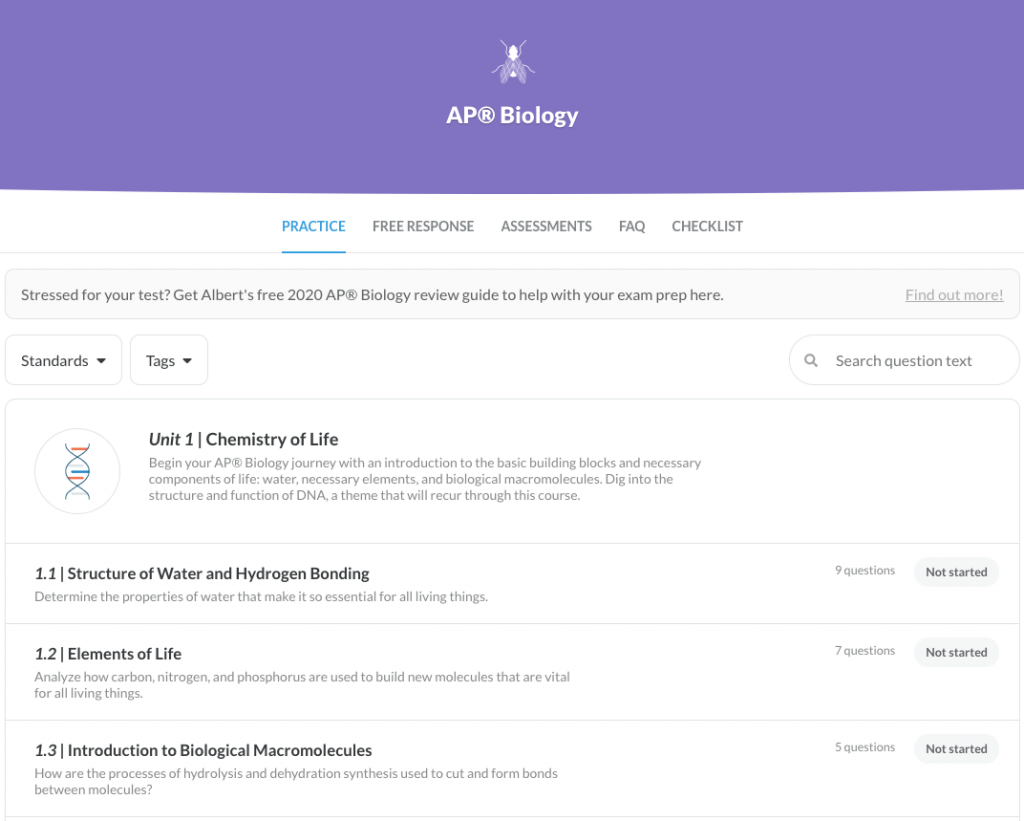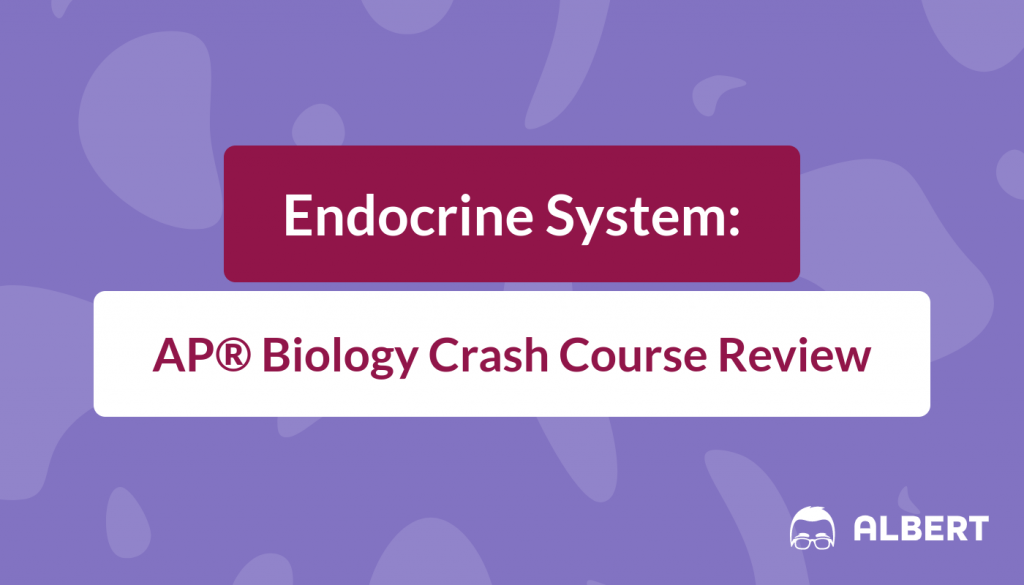Introduction to Endocrine System
In this AP® Biology crash course we will be talking about the endocrine system. The endocrine system is a system that regulates the secretion of hormones in order to control the body and mind. This system allows our bodies to do certain functions and have certain emotional states. All over our bodies are glands and vital organs that are controlled by the brain to direct our flow of hormones to allow life to happen.
The Pituitary Gland
One of the most important parts of the endocrine system is the pituitary gland. The pituitary gland is found at the bottom of the brain in humans and this glad contains two parts. These parts are called the anterior lobe and the posterior lobe. Each lobe has a specific function, although both release hormones.
The Anterior Lobe
The anterior lobe has seven hormones that it secretes. One of the most important hormones is the human growth hormone, or otherwise known as somatotropin. This hormone allows regular growth to occur when the pituitary gland releases the correct amount. When the anterior lobe secretes too much of this hormone, then the result is gigantism. Gigantism is often caused by a tumor on the pituitary gland and is often passed genetically through mutated genes. If there is not enough human growth hormone released, then dwarfism occurs. Dwarfismis when the opposite occurs. The individual simply does not grow as expected and the individual ends up below four feet ten inches tall. People with gigantism and dwarfism can lead normal lives with some alterations to their homes and day to day activities as well as medical attention to their different skeletal issues.
The anterior lobe also secretes prolactin. Prolactin, also referred to as the lactogenic hormone, triggers breast development and lactation in females. The third hormone, the adrenocorticotropic hormone, is another hormone secreted by the anterior lobe, and it controls the adrenal glands that secrete adrenaline in a dangerous situation. Adrenaline is used to trigger the fight or flight response in a scary situation.
The fourth hormone is a thyroid-stimulating hormone that does exactly that. The thyroid is triggered to secrete glands that can affect the weight gain or loss of the individual as well as other factors.
The fifth hormone is the follicle-stimulating hormone, which triggers the ovaries to make egg cells. This is followed later by the luteinizing hormone that matures those egg cells. For men, these two hormones are not present. Instead, the interstitial cell-stimulating hormone stimulates the production of sperm in the testicles.
The final hormone that is secreted by the anterior lobe of the pituitary gland is the melanocyte-stimulating hormone. This hormone allows pigment that colors our skin to be made.
The Posterior Lobe
The posterior lobe to the pituitary gland produces only two hormones. The first one is an anti-diuretic hormone. This means that this hormone, normally called vasopressin, triggers the kidneys to reabsorb water. If this hormone is not sent out, then the body will not save enough water. The water filtered through the kidneys will be sent out of the body as waste when it could be reused. This will make you extremely dehydrated, which may cause complications.
The second hormone is found in women. This hormone is called oxytocin, and oxytocin allows the uterine muscles to contract during labor. This allows child birth to happen naturally. If your posterior area of the pituitary gland does not send out oxytocin, then a Caesarian section must be done, as opposed to a natural birth, in order to remove the unborn baby from the uterus.
The Thyroid Gland
The next portion of the endocrine system is the thyroid gland. This important gland releases a hormone called thyroxine that controls the rate at which your body metabolizes glucose into adenosine triphosphate during cellular respiration. The amount of thyroxine available to the body depends on how much iodine is present. An iodine deficiency is often the main cause for the thyroid to enlarge. This enlargement is often called a goiter and is treatable with iodine supplements.
The thyroid gland also releases another hormone that is called calcitonin. Calcitonin is the hormone that releases calcium into the blood stream, which allows the body to benefit from the vitamin. We need this hormone to keep up good bone health!
Adrenal Glands
The next part of the endocrine system is vital to the survival of our species. The adrenal glands are two triangle shaped glands that are located on top of the kidneys within the body. These glands secrete epinephrine, otherwise known as adrenaline. Epinephrine, when triggered to be released by the adrenal glands, elevates your breathing, heart rate, blood pressure, and blood supply to the skeletal muscles. This is because adrenaline is usually triggered in a circumstance that causes you distress. Your body responds by giving you a boost of energy and oxygen to your muscles that it assumes that you will need. Adrenaline is nice when you are actually in a dangerous situation, but unfortunately it is often used most commonly in my body when I need to give a speech. The flight or fight response that is triggered has kept our species alive; however, it can be cumbersome in modern society.
The adrenal glands have another function in the body as well. Corticosteroids are sent out to the body through the adrenal glands. The two steroid hormones that are released are mineralocorticoids and glucocorticoids. Mineralocorticoids are used to control how fast or slow the body uses up minerals in the body. One example of a mineralocorticoid is aldosterone. Glucocorticoids are steroids that assist with protein synthesis as well as glucose metabolism and anti-inflammatory agents within the body. Some examples of a glucocorticoid are cortisol and cortisone.
Pancreas
The pancreas, an obscure organ that you may have forgotten during an anatomy quiz, is another vital part of the endocrine system. This vital organ is located behind the stomach and is a hormonal powerhouse. While only two hormones are pumped out of the pancreas, these hormones are extremely important. The pancreas sends out the hormones insulin and glucagon.
Insulin is the hormone that regulates the glucose metabolism. Insulin also allows sugar passage into the cells. This can be problematic when the pancreas does not produce enough or produces way too much insulin, which is a condition called diabetes. Diabetes does not allow the cell to have enough accessor too much access to sugar, a substance that the cells need to live and thrive. Some types of diabetes can be managed with insulin injections and diet.
Glucagon is another hormone that is necessary in the body. This hormone within the endocrine system releases adipose tissue and other fat cells to be used for energy. Without glucagon the body would just build up fat until the person died from obesity complications. Having the correct glucagon levels are very important for that reason. Sometimes men and women that are trying to lose weight cannot because they are not releasing enough of this hormone.
The Ovaries and Testicles
Believe it or not, the ovaries are also part of the endocrine system. Ovaries give off estrogens, which is also a hormone. This allows women to go through puberty to eventually be able to have a child. In men, testicles give off testosterone, which triggers puberty in males. This allows men to be ready for sexual reproduction as well as developing secondary sex characteristics like body hair.
The Thymus Gland
The thymus gland is a small gland that is located in the tissues of the neck. The thymus gland has a very important job in that it secretes thymosins. Thymosins regulate the creation of T-lymphocytes in the body, which strengthens the immune system.
The Pineal Gland
This gland is the last major gland in the endocrine system. While most of the pineal gland’s functions are shrouded in mystery, scientists can agree that it has something to do with secreting hormones that control behaviors in mating and day-night cycles.
Why is this Important to AP® Biology?
The endocrine system is important to AP® Biology, because of the impact it has on every part of the organism. The endocrine system controls sexual reproduction, which is the point of life for many organisms. It also controls your metabolism, your feelings, and everything in between. The endocrine system is sometimes glossed over, but the fact that you have these chemicals affecting your cells and tissues allows your body to understand what it needs to do. The brain controls your body, but it needs help to get those messages across. The hormones of the endocrine system help the brain do that. Do you have any questions about the endocrine system? Let us know!
Need help preparing for your AP® Biology exam?

Albert has hundreds of AP® Biology practice questions, free response, and full-length practice tests to try out.
Are you a teacher or administrator interested in boosting AP® Biology student outcomes?
Learn more about our school licenses here.
















